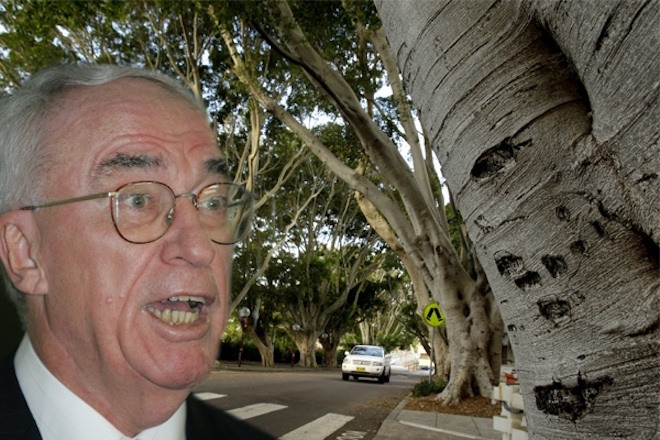With great respect
 Judges •
Judges •  Wednesday, September 15, 2004
Wednesday, September 15, 2004 Warfare on the High Court ... McHugh and Kirbs go hammer and tongs on argument about "indefinite detention" for aliens ... Boys. Boys. That’s quite enough ... From Justinian's archive, September 15, 2004 ... Ouch
 McHugh - exasperated by Kirby
McHugh - exasperated by Kirby
TESTINESS between McHugh J and Kirby J has been building for a while.
Last year in Rivkin v Fairfax, the great High Court deliberation on jury “perversity”, there was a bit of snarling with Kirby describing McHugh’s minority reasons as “excessively defensive” of the jury and “insufficiently attentive” of the appellate court.
McHugh thought that it had been open to the jury to find that none of Rivkin’s imputations arose from the newspaper articles in question.
Kirbs got quite arch about that and among other things said that McHugh had adopted a “highly artificial” approach and was bordering on the “starry-eyed”.
That was all relatively modest compared with last month’s all out biffo between Kirbs and McHugh in Al-Kateb v Department of Immigration.
The two judges were in opposite corners on the issue of whether the Constitution could prevent the Commonwealth government locking-up an alien indefinitely.
Kirbs, in this one, was on the side of the Angels and McHugh sided with the Forces of Darkness.
The majority in Al-Kateb came to the conclusion that there is no inhibition on indefinite incarceration of stateless aliens if no other country will have them.
Smiler and Gummow, both in the minority, got around the problem with some inspired legislative interpretations.
Kirbs supported that approach, but delved into international law and English and US decisions to bolster his position.
He also thought that an indefinite period of detention could amount to a punishment, and under the Constitution punishment is the responsibility of the judiciary, not the other arms of government.
Judicial bitchiness is one of the few things that gives a modicum of pleasure to the job of ploughing through High Court decisions.
McHugh’s tone towards Kirbs in Al-Kateb was one of the exasperated schoolteacher with a dim pupil.
Kirby had great joy in trawling through random bits of McHugh’s former pronouncements and flinging them back in his face.
Both spent the vast majority of their reasons trying to level the score. It was spell-binding.
McHugh said that Kirbs’ invocation of the Communist Party case does not assist Mr Al-Kateb:
“The Communist Party case had nothing to do with aliens” and no one found there had been any contravention of the judicial power of the Constitution.
“Nor does it assist Mr Al-Kateb’s case to assert [as Kirbs did] that this court ‘should be no less defensive of personal liberty in Australia than the courts of the United States, the United Kingdom and the Privy Council for Hong Kong have been, all of which have withheld from the executive a power of unlimited detention’.”
None of the cases decided in those jurisdictions were concerned with whether the legislature was exercising judicial power, McHugh insisted.
As expected, Kirbs put a lot of weight on international law which McHugh thought was out of line:
“It is even more difficult to accept that the Constitution’s meaning is affected by rules created by the agreements and practices of other countries. If that were the case, judges would have to have a ‘loose-leaf’ copy of the Constitution.”
Kirbs shot back:
“In any event, constitutional lawyers do indeed have ‘loose-leaf’ copies of the Constitution in which text is elaborated by the decisions of this and other courts ...
The constitutional courts of many other countries now adopt the interpretative approach that I favour. They reject the approach that McHugh J supports in this case.”
So there.
Kirbs went so far as to cast the most bruising insult imaginable, saying that McHuge’s opinions were on par with (right-wing ideologue and Dick Chaney’s duck shooting pal) Antonin Scalia of the US Supreme Court in a couple of detention cases.
McHugh replied:
“It is not true, as Kirby J asserts, that ‘indefinite detention at the will of the executive, and according to its opinions, actions and judgments, is alien to Australia’s constitutional arrangements’.”
He cited the national security arrangements in place in the First and Second World Wars, where people could be locked up indefinitely.
Kirbs responded:
“I do not doubt that if Australia were faced with challenges of war today, this court, strengthened by the post-war decision in the Communist Party case and other cases since, would approach the matter differently than it did in the decisions which McHugh J has cited with apparent approval.”
McHugh said that what Kirbs and the other minority reasons sought to do was “amend the Constitution under the guise of interpretation”.
Kirbs was livid at that one:
"My conclusion is no more a judicial attempt to ‘amend the Constitution under the guise of interpretation’ than were the many decisions of this court, in which McHugh J participated, where the process of interpretation produced a significant change to earlier understandings of that document.
If one new interpretation is forbidden, so are others. We should not declare interpretations impermissible just because we do not agree with them, as McHugh J has written elsewhere [News Ltd v South Sydney District Rugby league Football Club]."
And the cases in which McHugh participated where the court’s interpretation brought about a significant change to the Constitution? Thoughtfully, Kirbs listed:
- Nationwide News v Wills
- Australian Capital Television v The Commonwealth
- Cheatle v The Queen
- Kable
- Ha v New South Wales
- Lange
- Nicholas v the Queen
- Mabo
- Dietrich v The Queen
And who said the following on a sun-drenched-Campari-and-soda-sort-of-day in Florence in June this year?
“It is difficult to believe that Australia would have been as politically free a country as it is today if the High Court had upheld the validity of the legislation challenged in the Communist Party case. If that legislation had survived, its legacy must have influenced the way that we give effect to political rights and freedoms.”
Kirbs tossed that one back over the trench.
Sadly, when the reasons in Singh v The Commonwealth were published last week, someone must have thrown a bucket of water over the two combatants because even though again they were on opposing sides of the outcome, on whether someone born in Australia could be an unlawful non-citizen, only icy restraint was evident.
Interestingly in Singh, Kirbs signed-up the Forces of Darkness (someone born in Australia was a non-citizen if the parents were aliens) whereas McHuge became an Angel:
"A a person born in Australia is not, never has been and, without a constitutional amendment, never could be an alien unless that person falls within one of three categories. None of those categories applies to Ms Singh."










Reader Comments